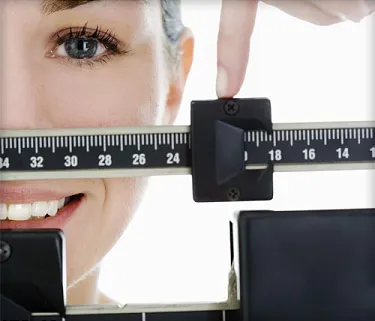Weight Loss Basics
Time to make some changes in your diet? If it's time to lose weight, get motivation here.
Deciding to Lose Weight
How Much Should I Weigh?
Struggling with extra weight and feeling frustrated? Learn about the many health benefits from losing just 10% of your body weight.
Ideal Weight or Happy Weight?
How much weight do you really need to lose?
Maybe you've been working on getting back to the weight you were at in high school or on your wedding day. But do you really need to go that low? Or can you weigh more than your ideal weight and still be healthy?
If you're overweight, losing just 10% of your body weight is linked to many health benefits, including lowering blood pressure, blood cholesterol, and blood sugar, and reducing your risk for heart disease. This kind of weight loss is also easier to reach and keep for the long run.

Your Weight "Set Point"
Just as your body temperature is programmed to stay around 98.6 degrees, your body weight is naturally regulated to stay within a range of 10%-20%, says Thomas Wadden, PhD, director of the Center for Weight and Eating Disorders at University of Pennsylvania Medical School. This weight range is known as the "set point."
A complex set of hormones, chemicals, and hunger signals help your body keep your weight within this range, says dietitian Dawn Jackson Blatner, RD.
It is not just about your genes. Your eating and exercise habits can also help to determine your set point.
"Overeating swamps the internal regulatory system, and, as a result, the set point increases -- which is much easier to do than it is to lower it," Wadden says. The body adjusts to the higher weight and "resets" the set point to defend the new weight.
It's still possible to set your range lower. "With changes in healthy eating and exercise behavior, you can lower your set point," says Blatner.
The 10% Solution to Weight Loss
Losing 10% of your body weight, and keeping it off for six months to a year, helps your body reset your set point, notes George Blackburn, MD, in his book, Break Through Your Set Point: How to Finally Lose the Weight You Want and Keep It Off.
When you lose large amounts of weight at once, you set up an internal struggle and hormones spike to make you hungrier as your body tries to defend its comfortable range, Wadden explains.
That's why experts recommend losing 10% by changing your eating and exercise habits, and then maintaining your new weight for a few months before trying to lose more. Your body will get the signal to lower its "set point," and you'll get used to new food choices, smaller portions, and regular exercise.
Blatner says she has seen people who lose 10% of their weight "start to realize how a little weight loss impacts their health in very positive ways... They feel better, sleep better, have more energy or less joint pain, and some people are able to reduce medications."
How Much Should I Weigh?
Most people overestimate how much weight they can lose, which leads to frustration, says Blatner. To find your happy or healthy weight, Blatner suggests looking back on your weight history as an adult and identifying a weight you were able to maintain fairly easily.
Instead of focusing on the numbers on the scale, Blatner suggests setting goals for behavior. "Eat breakfast every day, go for daily walks, eat more fruits and vegetables," she says. "When you set behavior goals, they are easier to accomplish and they make you feel good." Stick with these behaviors for 3-6 months and they will become part of your life.
Based on your current weight, eat about 10 calories per pound of nutritious food (low in fat, rich in lean protein, high in fiber), get regular exercise, and assess your weight after a month or so.
"Your weight will settle out and typically you will lose 10%, then hit a plateau, which is a good time to maintain the weight loss," Wadden says.
As you get to a healthy weight, you can go up to 12 calories per pound.
Tips for Weight Loss Success
Here are some tips from Blatner for weight loss success:
- Eat regular meals. People who eat regular meals eat fewer calories than those who eat at random times.
- Use a plate, sit down, and enjoy your meals. People who do this eat smaller portions than those who eat out of containers or on the run, according to Blatner.
- Get at least 30 minutes of moderate activity each day.
- How much and what you eat makes a big difference. Enjoy normal portions of foods that are high in fiber (fruits, veggies, whole grains) and rich in lean or low fat protein is the secret to feeling full.
- Think beyond the scale. Focus on the benefits of a healthier lifestyle rather than any particular number.

No comments:
Post a Comment